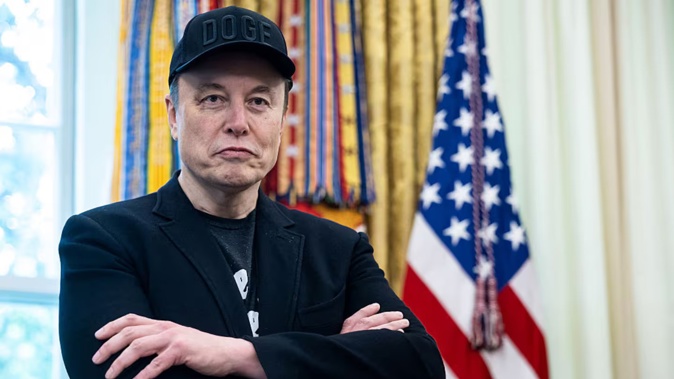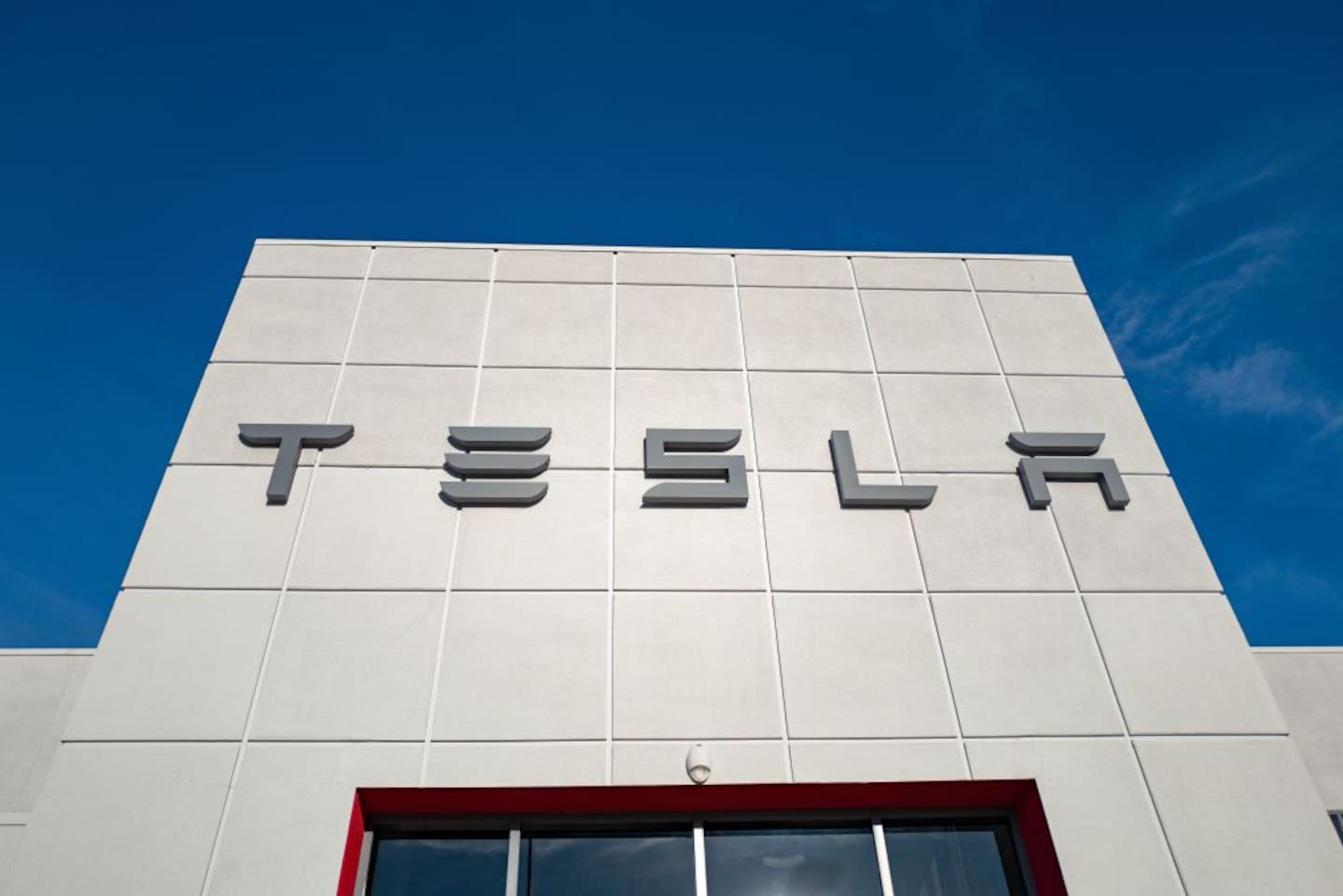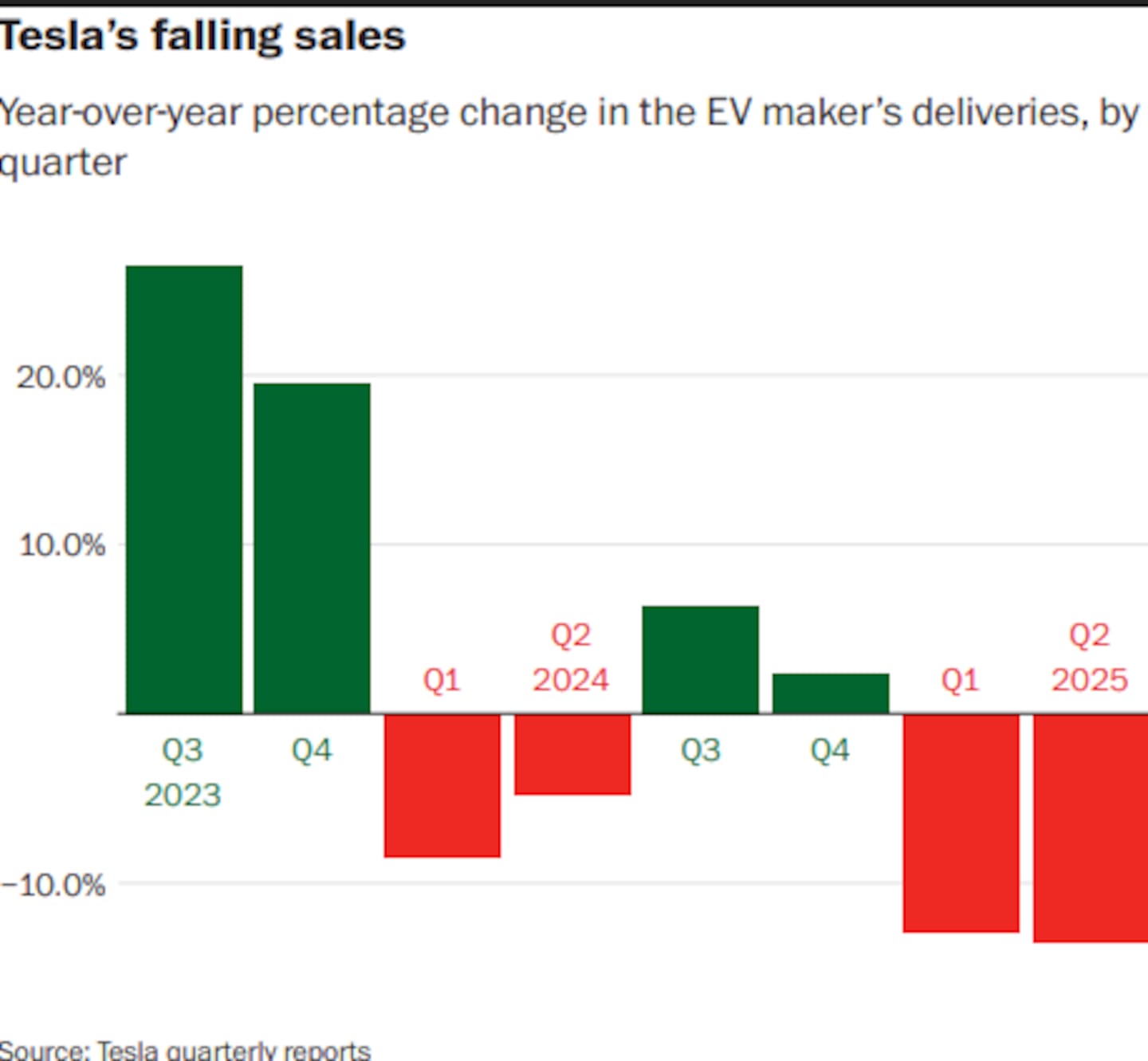
Electric vehicle maker Tesla has reported a further slump in global sales, the day after the US Senate sent the House a massive tax and spending bill that includes a provision to end a popular EV tax credit.
Tesla saw a 13.5% decline in global sales in the second quarter, to 384,122 vehicles delivered from 443,956 during the same period last year.
The fall continues a trend that started last year and accelerated during chief executive Elon Musk’s controversial stint in government during the early months of President Donald Trump’s second term. In its first-quarter earnings report this year, Tesla reported a 71% year-over-year decline in profits, as EV deliveries fell 13%.
Tesla was already struggling at the beginning of the year because of increased competition for EVs, but analysts and shareholders have largely attributed the company’s recent woes to Musk’s role with the US Department of Government Efficiency (Doge), in which he oversaw layoffs and budget cuts.
In a May interview with Bloomberg at the Qatar Economic Forum, Musk said without evidence that Tesla’s sales remained “strong everywhere” except Europe, which he said was its “weakest market”. He also said that, while Tesla “lost some sales from the left”, it “gained some from the right”.
But analysts see new problems, as Musk has clashed publicly with Trump over provisions in the President’s tax and spending bill, which would raise the national debt by trillions and end a US$7500 tax credit for buyers of EVs. The Senate passed the bill by Deputy President JD Vance’s casting vote, sending it back to the House of Representatives for approval.

The Senate has passed a bill that would eliminate the US$7500 tax credit for electric vehicles. Photo / Getty Images
Since leaving his government role, Musk has railed against the bill, blasting its costs to taxpayers as well as the loss of the tax credit. The billionaire, who also leads SpaceX, has repeatedly chided Trump from his social media site, X, and has threatened to start a new party that could peel away Republican voters. Trump has responded on his own Truth Social platform by suggesting Musk’s business with the federal Government could be in trouble.
Wedbush Securities analyst Dan Ives said Musk’s continued presence on the political stage would hurt Tesla. “The last thing you want is to turn Trump from a BFF to an enemy,” Ives said in an interview this week.
Tesla was betting big on fully autonomous vehicles, which would inevitably be subject to regulatory scrutiny from Washington, Ives said. Being on Trump’s bad side could hamper Tesla’s ambitions and worry investors, though Ives was optimistic that “cooler heads will prevail”.
Wall Street reacted positively to Wednesday’s sales figures, with Tesla shares closing 5% higher.

Photo: Tesla Quarterly Reports
Will axing the EV tax credit hurt Tesla?
The bill passed by the Senate would eliminate a $7500 tax credit for buyers of US-made electric vehicles. The credit, part of the Inflation Reduction Act that President Joe Biden signed into law two years ago, was meant to stoke demand for EVs, which are typically more expensive than petrol-powered vehicles.
As of May, the average price paid for a new EV was $57,734, compared with $48,799 for a petrol-powered car, according to Kelley Blue Book data.
As of October, taxpayers had claimed the EV credit 300,000 times, saving them a combined $2 billion, according to the Treasury Department. Ending the tax credit is likely to depress sales for Tesla and other US car manufacturers, but Tesla appears better positioned to take the hit.
“I think the EV tax credit would initially hurt all automakers, including Tesla, as it would likely result in lower near-term EV sales,” Seth Goldstein, an analyst with Morningstar Research, said. “However, Tesla is profitable and will likely remain profitable even without the subsidy, so I see little long-term impact to the company.”
Ives predicted that the loss of the credit would probably reduce Tesla’s US sales by between 10% and 12%. “Even though this was expected, it adds another headwind to domestic sales,” he said, adding that the Big Three Detroit carmakers would probably be hit harder, as demand for EVs has languished for the past 18 months.
All carmakers were now at a crossroads, said Chris Harto, a senior policy analyst at Consumer Reports. Declines in demand, accelerated by the loss of the tax credit, could prompt manufacturers to reduce their spending on EVs.
But he warned there was danger in cutting investments as EV manufacturing processes and technology improved. “There’s a real risk that if you pull back too much, you’re not ready for that point where these vehicles achieve true affordability for the consumer.”
Trisha Thadani contributed to this report.
Take your Radio, Podcasts and Music with you









